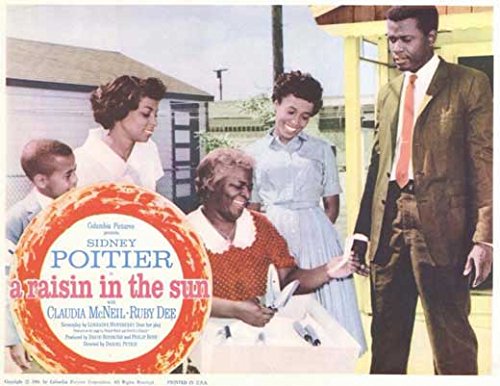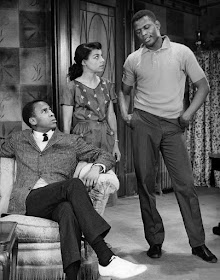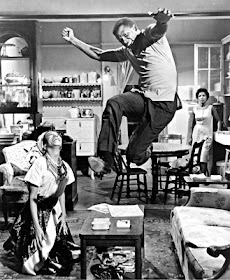 'The Criterion Collection' are happy to release a digitally re-mastered edition of the 128-minute classic, 'A Raisin In The Sun'. It was directed by Daniel Petrie; it stars Sidney Poitier, Claudia McNeil, and Ruby Dee; and it's complemented with a number of very special features. This includes interviews, featurettes, essays, and a theatrical trailer. Please enjoy.
'The Criterion Collection' are happy to release a digitally re-mastered edition of the 128-minute classic, 'A Raisin In The Sun'. It was directed by Daniel Petrie; it stars Sidney Poitier, Claudia McNeil, and Ruby Dee; and it's complemented with a number of very special features. This includes interviews, featurettes, essays, and a theatrical trailer. Please enjoy.A Raisin In The Sun [The Criterion Collection]
THE STORY:
Lord? Can you hear me, oh Lord? Because if you can, please, I beg you, spare me some time so you can advise me on a very delicate situation.
Well, as you most probably know, this morning I received a check in the post, a check for ten thousand dollars, which was bequeathed to me by my late husband, Big Walter. But the problem is, I’m not entirely sure what I should do with it!
I mean, should I give it to my daughter, Beneatha (Diana Sands)? Who's presently training to become a doctor at the local college! Or should I give it to my son, Little Walter (Sidney Poitier)? Who, unlike his sister, is a hardworking family man, with a beautiful wife, Ruth (Ruby Dee), a loving son, Travis (Steven Perry), and hopefully another little one on the way soon.
Yes. That’s right. I’m going to be a grandmother again. Praise be! Which is most probably why Walter is always on the lookout to make a quick buck! Come to think of it, Beneatha isn’t any better, because she always has her head in the clouds with men, politics, or one of her many, many, hobbies. So please, Lord, point me in the right direction. Show me a sign. Otherwise, I may give it all away to charity or buy us a brand new home to live! After all, the place we’re currently staying is too old, too overcrowded, and holds too many memories for us to cope with. So please, show me a way out of this mess -- me, Lena Younger (Claudia McNeil), the head of this house -- or else what next transpires may go from bad to worse when a decision is finally made. As a daughter is shown a loving face - a son takes a long fall from grace - a house may not be a respectable place - and at the end of the day, black or white, who cares about race?
THE REVIEW:
Before we begin, I would just like to say that I’m not African American (I’m Greek Cypriot), I wasn’t born during the era this film was set (the 1960s), and most importantly of them all, I don’t like to judge a person by the color of their skin (only by the validity of their own actions). Having said that, though, I still like to think that I can relate to most of the characters featured in ‘A Raisin in the Sun’, along with the underlying message behind it: Be true to yourself and don’t confuse principles with profit. After all, it is a film of many different parts, with each part either focused on race, poverty, cultural identity, or the fact that there’s a divide among the generations.
Before we begin, I would just like to say that I’m not African American (I’m Greek Cypriot), I wasn’t born during the era this film was set (the 1960s), and most importantly of them all, I don’t like to judge a person by the color of their skin (only by the validity of their own actions). Having said that, though, I still like to think that I can relate to most of the characters featured in ‘A Raisin in the Sun’, along with the underlying message behind it: Be true to yourself and don’t confuse principles with profit. After all, it is a film of many different parts, with each part either focused on race, poverty, cultural identity, or the fact that there’s a divide among the generations.
Well, let’s face it, there has always been a generational divide, an obvious one at that, where one day we’ll wake up and realize that most of our heroes are dead, all the new songs sound shit, and the world around us feels different, strange, almost as if we’re living on an alien planet that's familiar yet vastly different.
Funnily enough, the same thing can also be said about racism, that’s strange too; because I don’t entirely understand why one person would despise another just because of the way they look. But unfortunately these things happen, and in many ways justifies why this film is such an important and groundbreaking one to watch.
You see, what we have to remember, is that the development and eventual release of this old-school drama happened during a very turbulent time in American history, commonly known as the ‘Civil Rights’ period. It was roughly a few years after the activist, Rosa Parks, was arrested for sitting near the front of the bus, and a few months before the reverend, Martin Luther King Jr, began his struggle to stop widespread segregation. All of which obviously wasn’t fair for our darker skinned compadres and aptly caused them to revolt against their lighter skinned oppressors.
Now don’t get me wrong. This movie doesn’t ‘fight back against whitey’ by calling them names or telling them how bad they are (within reason). What it does instead is to show us that there is a common link between the races and that most Americans are striving for a similar way of life: That being, the American Dream, with the quaint suburban house, the white-picket-fence, the nice post-modern family, and, you know, all of that jazz.
So how does it go about doing this? Well, quite cleverly, I might add, because it manages to guide each of the principal characters throughout the narrative in order to gain some sort of emotional progression. For instance, Beneatha, (as played exquisitely by the adorable Diana Sands) starts off as the proto-typical feminist who eventually learns that the world around her is far different than she wants to believe. Then there’s Lena, the matriarchal figure, (as played by the charming, Claudia McNeil) who slowly comes to the realization that money can corrupt and that time can change peoples attitudes. Whereas Little Walter, on the other hand, (as played magnificently by the main man himself, Sidney Poitier), comes across as your stereotypical wannabe businessman who finds out, the hard way, that money isn’t everything. An additional shout-out should also go to Ruby Dee (who plays the downtrodden housewife, Ruth), saying so because she’s the glue that joins together each of the characters within this 'Kitchen-Sink-Drama', either emotionally, spiritually, or through a common bond of love and respect.
Anyway, that’s enough of that, because I’m sure by now you know what I think about this movie. It’s a great movie, a really great movie, and I thoroughly enjoyed it from beginning to end. So, for the time being, let us take a short break by checking out the following filmic facts: (1) 'Columbia Pictures' first screened this one point five million dollar production at the 'Cannes Film Festival' on the exact same month the American actor George Clooney was born. The festival was held in France and the month was May, 1961. (2) This film was based on a stage-play written by Lorraine Hansberry, and it made its Broadway debut at the Ethel Barrymore Theatre on the 11th of March, 1959. Since then it has been adapted into three films [including this one], one musical, two radio plays, and four other revivals. (3) Loosely translated, this project was entitled 'Sunshine Is Not for Sale' in Hungary; 'The Sun Shines for Everyone' in Mexico; and 'A Broken Illusion in the Sun' in Finland. (4) As I'm on the topic of titles, you might like to know that the name of this flick originally derived from a poem written by Langston Hughes, "Harlem: What Happens To A Dream Deferred?". (5) Most of this movie was shot inside an unnamed studio, while other parts were shot on location throughout the American state of Chicago, Illinois. (6) The main tagline used to promote this picture, states: 'The Prize-Winning Drama That Warms The Screen With Its People and Its Passions!'. (7) In 1998, this classic slice of cinema was included in a list compiled by the American Film Institute, a list of the four hundred movies nominated for the 'Top 100 Greatest American Movies'. (8) After this drama started to unwind, Sidney Poitier starred in the musical-romance, 'Paris Blues'; Claudia McNeil starred in the TV series, 'The Doctors and the Nurses'; and Ruby Dee starred in the TV movie, 'Seven Times Monday'.
 In closing, I would just like to point out something that isn’t very apparent about the ending of ‘A Raisin In The Sun’. Well, without giving too much away, when this film finally comes to a close, the Younger family find themselves starting a new life in a neighborhood that doesn’t seem to want them. Which, unfortunately, is what happened to the writer of this film too, Lorraine Hansberry.
In closing, I would just like to point out something that isn’t very apparent about the ending of ‘A Raisin In The Sun’. Well, without giving too much away, when this film finally comes to a close, the Younger family find themselves starting a new life in a neighborhood that doesn’t seem to want them. Which, unfortunately, is what happened to the writer of this film too, Lorraine Hansberry.
You see, when she was a kid, her father, Carl Augustus Hansberry, was one of the first African American real-estate brokers living in Chicago (which is where this film is set), and he managed to develop a housing project for other African Americans to live in. But, after a while, he wanted something better for his own family, something more affluent, and so they moved to a white part of town with a promise of a bright new future. Ops! Bad idea. Because things didn’t really pan out in the way he hoped they would, and eventually this caused him to throw in the towel and move to Mexico.
Now, will the same thing happen to the Younger family? I hope not, I sincerely do, but the insinuation is that they still have more hardships to face, a lot more hardships, and thus defines this movie as a very poignant one for its time. So overall I’d say it’s a great slice of cinema which is well acted, well constructed, and well worth the watch, regardless of your origins.
THE RATING: A
A RAISIN IN THE SUN (1961)
 Reviewed by David Andrews
on
October 01, 2018
Rating:
Reviewed by David Andrews
on
October 01, 2018
Rating:
 Reviewed by David Andrews
on
October 01, 2018
Rating:
Reviewed by David Andrews
on
October 01, 2018
Rating:






No comments:
Post a Comment